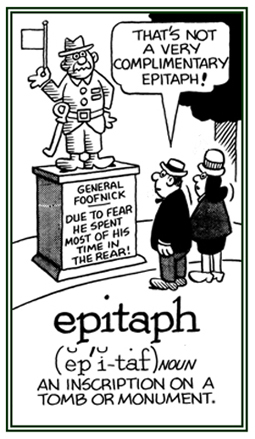tapho-, taph-, -taphia +
(Greek: burial, grave; tomb; funeral)
2. Etymology: from Greek kenotaphion; from kenos, "empty + taphos, "tomb".
2. A short speech or piece of writing celebrating the life of a recently deceased person: "The politician was asked to read the epitaph that the newspaper editor had written honoring the local city mayor who had died last week."
"An elegy is also known as a commemoration or a memoir for someone who has passed on."
"Sometimes an epitaph is a monumental lie."

Go to this Word A Day Revisited Index
so you can see more of Mickey Bach's cartoons.
It means that something has affected the original artifacts or deposits (a flood, previous digging, and earthquakes are all taphonomical things that could effect an archaeological site).
Archaeologists always look for evidence of taphonomical activity when ever something seems out of place (like finding a modern human skull buried in with some dinosaur bones).
2. The scientific study of fossilization.
3. The study of the processes; such as, burial, decay, and preservation which affect animal and plant remains as they become fossilized.
4. The study of the transformation of organic remains after death to form fossil and archaeological remains.
The study includes the processes that disturb and damage bones before, during, and after burial; such as, burial procedures, decay, and preservation. The focus is on an understanding of the processes resulting in the archaeological record.
2. A love or fondness for funerals.
3. A love of funerals, graves, and cemeteries.
4. In psychiatry, a morbid attraction to graves and cemeteries.
2. In psychiatry, someone who has a morbid attraction to graves and cemeteries.
Cross references of word groups that are related, directly or indirectly, to: "bury, burial, cemetery, grave; sleeping place": coimetro-; Epitaphs; funer-; sepulc-; sheol.

